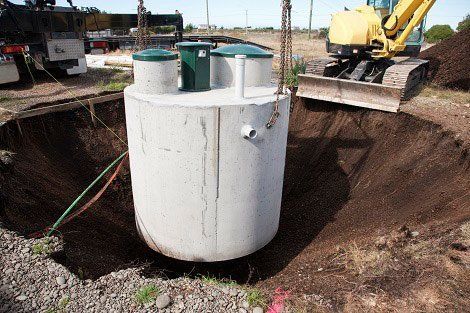
Moving into a home with a septic system, whether you're an old hand or a newbie where septic is concerned, is something you should never do without the proper precautions. You need to hire a professional for a thorough septic system inspection before you decide to buy in order to make sure things are functional and have been cleaned and pumped regularly.
However, there are some signs of trouble that you may be able to detect on your own even before paying for an inspection.
A septic system that isn't pumped out regularly can become irreparably clogged, contaminate the whole area and require replacement. If you notice some of these four signs and the seller won't admit there could be a problem, you may want to move on to the next potential house.
Drain Problems
Septic issues that occur when a system has been neglected for decades can often affect the drains. When the tank gets too full of solids, the sludge will start getting pushed down the pipes toward the leach field. These pipes are designed to handle only water, not sludge, so they can become either partially or fully clogged. When the pipes clog, you may experience backups or slow drains.
However, drain problems aren't always the first sign of a problem, so you should still have an inspection done if the drains seem to be working the way they are supposed to.
Suspicious Smells
Any odd smells of gas, sulfur or sewage that you smell on the property could be a red flag. This is the case whether the smells are inside the house (potentially coming from the drains) or outside near the septic tank or leach field. You shouldn't be able to smell a normally operating system from above ground unless you open the tank or are otherwise looking more closely at your septic system.
Standing Water or Marshy Spots
Standing water anywhere near the septic tank or leach field is a bad sign. Water can mean that the system is leaking, failing, or wasn't well-placed or well-constructed and isn't capable of treating wastewater properly.
Standing water could also be a sign that the current owners are abusing the system by draining runoff water from storms into the tank and overwhelming the system. This extra water can overwhelm the system and contaminate the surrounding areas.
Whatever the cause, if you notice wetness coming from the septic system, you should be aware that the problem could be expensive to fix.
Well Water Problems
If you're in an area that's not served by city sewer lines, chances are there's a private well on the same property as the septic system. If this is the case, you'll need to get both the well water and the septic system tested. A failing septic system can contaminate the groundwater, leading to unfortunate results when you have the well water tested.
If you find contaminants in the well water such as nitrates, nitrites or bacteria, a septic system failure could be one potential cause, and you'll need to look closer at the septic as well as looking for other sources of contamination.
A contaminated well could be a deal breaker for buying the house because the problem can be expensive to treat. A failing septic system at this stage could be so bad that it needs to be replaced entirely.
These four signs can alert even a layman to the possibility of a neglected, failing septic system. Whether you need more information on septic problems and inspections or just a regular everyday septic pumping service, feel free to give us a call for more information or
contact us online today.






